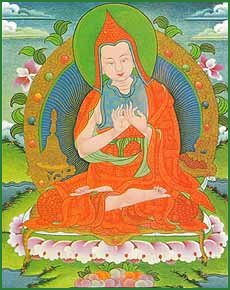The Great Chariot
by Longchenpa | 268,580 words
A Commentary on Great Perfection: The Nature of Mind, Easer of Weariness In Sanskrit the title is ‘Mahāsandhi-cittā-visranta-vṛtti-mahāratha-nāma’. In Tibetan ‘rDzogs pa chen po sems nyid ngal gso’i shing rta chen po shes bya ba ’...
A. The brief teaching
Even though the freedoms, so difficult to obtain, have been obtained, since our minds cannot remain enduringly stable, we are instructed that our nature is such that we need to exert ourselves:
Even if these hard-won freedoms have been gained,
Their destructible dharmas will not last for even an instant.
If they are examined, they are without an essence.
They are no more to be trusted than bubbles floating on water;
So contemplate day and night the certainty of death.
This life of the freedoms and favors that we have obtained, cannot be permanent, or last even for an instant. It has no heart, like a banana tree, a mere onion-like series of herbaceous layers that is hollow at the center, and will not bear analysis as truly existent. Like bubbles on water, it appears for only a moment. Then every one of its main and subsidiary characteristics is destroyed. On examination, those characteristics are necessarily found to be separable. Collection of Indicative Verses (Udanavarga. Ched du brjod pa’i choms/ tshoms) says:
Kye ma! How impermanent are all compounded things!
Anything that is born is going to be destroyed.
Since having once been born, all things will be destroyed,
If death comes quickly, we are fortunate.Like starry lamps obscured and clouded-over with mist,
Ephemeral things are like bubbles on water or drops of dew,
Dreamily insubstantial, like lightning and the clouds.
All compounded things are taught to be that way.
